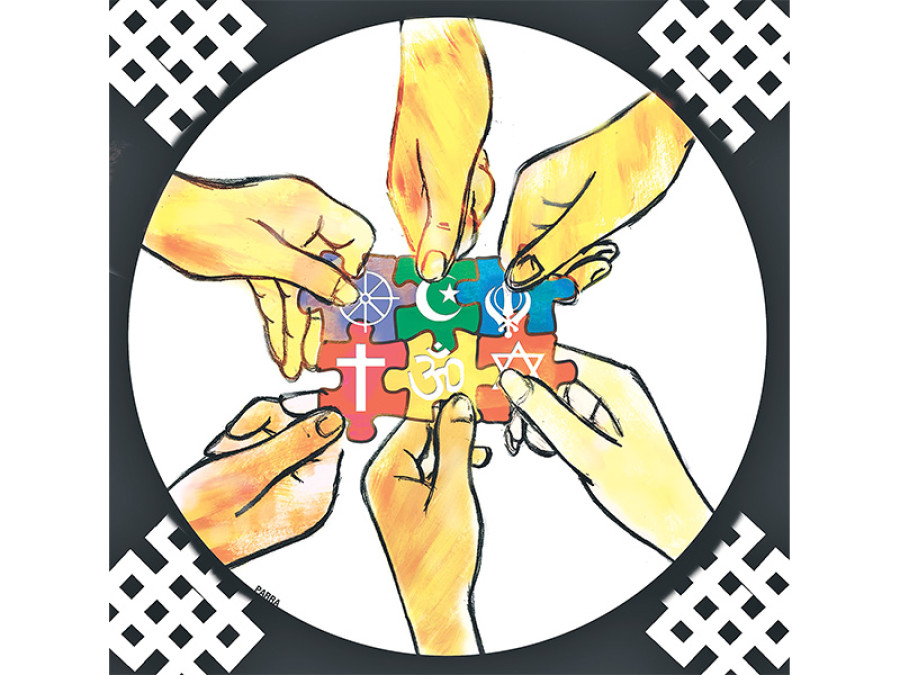Opinion
Let go of god
The constitution needs to clearly state that Nepal is a secular state
Gyan Basnet
As the demand for the restoration of Nepal’s identity as a Hindu state is gaining ground, the idea of secularism remains one of the most contentious and sensitive issue in the constitution. Our own experience and history demonstrate that the politics of caste and religion are not easy to handle. To avert any future disaster, there is a need to hold serious discussions on secularism within the Constituent Assembly (CA), the political parties and in
society.
Secularism merely implements a strict separation of the state from religion. Under this philosophy, people different religions and beliefs are treated equally. Secularism is not about marginalising religious people, nor does it have an anti-religious agenda. At a time when so many diverse views are circulating on this issue, we need to ask if people actually know the implications of being a secular state. I wish to add a few points about secularism for all of us to think about before we start to finalise the constitution.
Here and elsewhere
Firstly, every society is guided by its social norms, values, traditions, customs and—most importantly—its religion. Ours is no different. These social values have become so important that they dictate our way of life. For us, social rituals, ceremonies and festivals have traditionally been conducted according to the Hindu religion. Our laws have been guided by the Hindu philosophy, which has been rooted in our country for thousands of years. The Hindu religion—with its glorious past, its civilisation and its culture—is surely a rich inheritance for all of us.
Having said that, I strongly believe that secularism offers a fair democratic solution to the diverse social problems of the 21st century. Declaring Nepal to be a secular state is the need of the day, but there are a few serious questions for all of us to think about. How are we going to formulate policies and laws in a changed scenario? Have we given sufficient thought to the role of beliefs, values and faith in our public life? Do we need to banish all Hindu symbolisms—rooted in our history—in order to become truly secular? Is it possible to banish religion entirely from our public sphere? According to the 2011 national census, 81.3 percent of people the Nepal are Hindus. How shall we convince Hindu hardliners who are demanding a Hindu state that secularism seeks to ensure and protect the freedom of religious belief and practice of all citizens?
Secondly, around 100 countries—developed and under-developed—have incorporated secularism in their constitution. For instance, Article 4 of Fiji’s constitution explicitly guarantees religious liberty stating that religious belief is personal and that religion and the state are separate. The US also has no official religion at a federal or state level, even though the Bible is used for taking oaths in the court, or by the President while taking the oath of office. It is important to give attention to international constitutional practices on secularism.
Serious considerations
Finally, has there been enough debate and public awareness on this sensitive subject? Secularism means many things. It is about treating all people equally. It is about creating a common culture within diversity. It is about accepting diversity and toleration in society. It is about pluralism. It is certainly not about encouraging atheism in society. It is about state neutrality and protecting all gods, religious beliefs and faith groups. Religion is a sensitive issue that emotionally affects people from all walks of life.
For Nepal, moderate inclusive secularism is capable of achieving a positive result. The constitution needs to state in clear and simple language that Nepal is a secular state. Ambiguous and controversial statements such as ‘all individuals will have the right to exercise religious freedom’ must be avoided, as should controversial provisions similar to those enshrined in the constitutions of Bangladesh and Sri Lanka. Beliefs must be left to
the individual as a matter of personal choice.
We must be rational when we deal with religious beliefs. We must do more homework before we insert anything of this nature into the final draft of the constitution. We must consult with, cooperate with and convince all stakeholders and faith groups—including those who are demanding a Hindu state. But if we neglect the demands of the religious minority in the country, the consequences could be awful. We may be digging our own grave by planting the seeds of permanent conflict among the different ethnicities, religions and beliefs. In that case, no god, ideology, leader or law will be able to prevent future catastrophe.
Basnet is an advocate




 10.12°C Kathmandu
10.12°C Kathmandu










